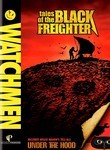 Originally intended for a live-action treatment said to have threatened a budget of $20 million, Tales of the Black Freighter is an animation cleaved from the theatrical release of Zack Snyder's Watchmen. Appearing in Alan Moore's graphic novel in five separate, carefully placed chunks, here it is melded to form a single, 26-minute narrative. It tells of a castaway sea captain's descent to madness following the death of his entire crew during the remorseless destruction of his ship. Specifically titled "Marooned" when considered as a component of the novel, Tales serves to reflect certain key aspects of Watchmen. Gerard Butler, who famously teamed with Snyder for the sweat-coated codpiece that is 300, voices the captain in this heavily symbolic tale.
Originally intended for a live-action treatment said to have threatened a budget of $20 million, Tales of the Black Freighter is an animation cleaved from the theatrical release of Zack Snyder's Watchmen. Appearing in Alan Moore's graphic novel in five separate, carefully placed chunks, here it is melded to form a single, 26-minute narrative. It tells of a castaway sea captain's descent to madness following the death of his entire crew during the remorseless destruction of his ship. Specifically titled "Marooned" when considered as a component of the novel, Tales serves to reflect certain key aspects of Watchmen. Gerard Butler, who famously teamed with Snyder for the sweat-coated codpiece that is 300, voices the captain in this heavily symbolic tale.This DVD release is particularly unusual seeing as not only does it compile several deleted scenes in to one short film, it also strips the scenes of their reference point. The pertinence of "Marooned" is arguably the most difficult bit of Moore's story to comprehend and without Bernie, the character also known as "the kid" who reads the adventure in the fictional "Tales of the Black Freighter" comic book, or any of Watchmen's other trappings, it flounders. Only those familiar with the alternate world of costumed heroes will be able to unearth Tales' redeemable qualities.
The short feature presentation opens with moody promise thanks to ominous chords that see the introduction of the sea's choppy murk. Mostly preserved, though by different methods than have been previously utilized, is the pulpy aura, letting us know how to receive the proceedings. The animation immediately evokes the pseudo-anime stylings of Peter Chung's unrivaled Æon Flux, here seasoned with the smooth and calculated feel of a Macromedia Flash presentation. Also in the fray is a greater sense of drama than was brought forth in the source material. There was nothing the matter as it was, but in this medium it benefits from the emotional enhancement.
Sound decent? It is... until Butler begins to sound off. Considering its surroundings, Butler's characteristically overwrought performance almost works, but even the eloquent dialogue recited isn't enough to rescue it from becoming another case of 'too much.' Butler isn't entirely to blame, of course. His oration also heralds the key downfall Tales suffers as a stand-alone - breakneck pacing. Emulating a 4-year-old lacquered with Crunk Energy Drink, the story stampedes forth, allowing little time for absorption. To a certain extent this implicates the eager reading of a fresh comic book but similar to an issue present in Watchmen it doesn't allow near enough time to appreciate the significance of the material. Only around the halfway mark is the madness successfully captured. Prior to the descent that practically conjures Conrad's seminal "Heart of Darkness," the depicted gore is rendered uncalled-for and exploitative due to its seeming lack of relevance. Also established far too late is the 'what' of the Freighter. Anyone who has not experienced the graphic novel is sure to either wonder what on earth it is or simply assume it to be Captain Barbossa's latest cinematic blasphemy.
Wrapping things up with a reminder as to why many of us love Moore's book is the song "Seeräuberjenny," or "Pirate Jenny" as it is known in English, from the "Threepenny Opera" (famous for the song "Mack the Knife"). Its harrowing tone and cautionary lyrics are appropriately groovy as they lead us through the closing credits. Apparently Moore has cited the tune as partial inspiration when it came to penning "Marooned."
Further warranting the DVD's purchase or rental is PG-rated The Culpeper Minute: Under the Hood, a mock talk show clocking in at 38 minutes. This relatively unique supporting feature is based on another of the original material's side stories - the character Hollis Mason's autobiography. In theory, this is an interesting idea, due in part to the use of costumes authentic to their sources (IE Hooded Justice and Moth Man) but it winds up a self-congratulatory and shallow exercise. The unfocused information, feeling overlong in spite of its brevity, is important but is tackled effectively enough in Watchmen. While not quite breaching the realm of tedium here, it feels completely unnecessary and occasionally laughable. Far more rewarding is the special feature Story Within a Story, which, though sprawling, has more insight in to the subjects danced around by Under the Hood.
Also included is a preview of the mildly interesting yet sickeningly uninspired "motion comic" that promises to underwhelm while narrator Tony Stechschulte's deliveries destroy the book's iconic dialogue.
Both Tales of the Black Freighter and Under the Hood are strictly for die-hards. They flesh out, for better or for worse, the cinematic world of Watchmen while further alienating the uninitiated. Thankfully, Tales will likely be better served broken up and dispersed throughout its parent film if/when a comprehensive edit is released.

